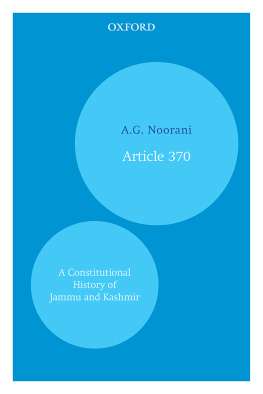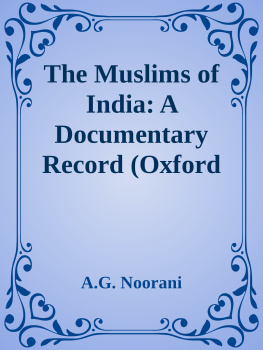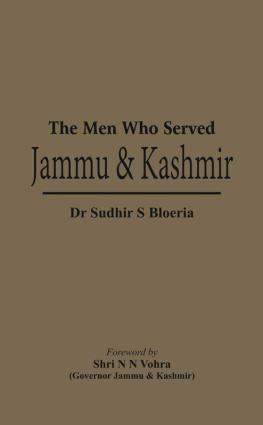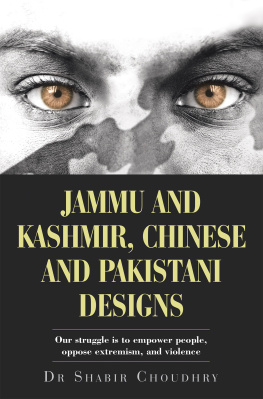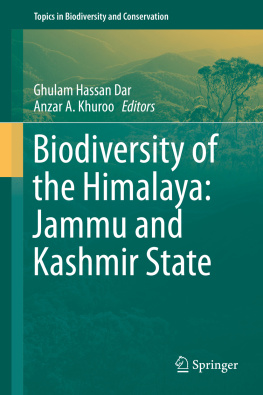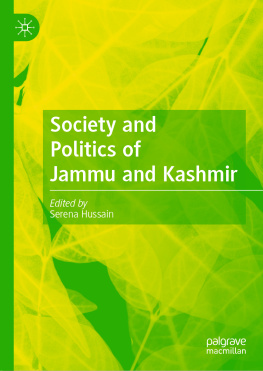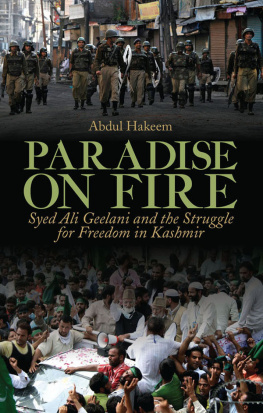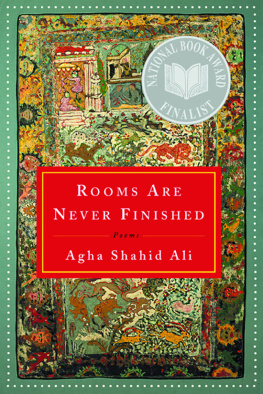A.G. Noorani - Article 370: A Constitutional History of Jammu and Kashmir
Here you can read online A.G. Noorani - Article 370: A Constitutional History of Jammu and Kashmir full text of the book (entire story) in english for free. Download pdf and epub, get meaning, cover and reviews about this ebook. year: 2014, publisher: OUP India, genre: Politics. Description of the work, (preface) as well as reviews are available. Best literature library LitArk.com created for fans of good reading and offers a wide selection of genres:
Romance novel
Science fiction
Adventure
Detective
Science
History
Home and family
Prose
Art
Politics
Computer
Non-fiction
Religion
Business
Children
Humor
Choose a favorite category and find really read worthwhile books. Enjoy immersion in the world of imagination, feel the emotions of the characters or learn something new for yourself, make an fascinating discovery.
- Book:Article 370: A Constitutional History of Jammu and Kashmir
- Author:
- Publisher:OUP India
- Genre:
- Year:2014
- Rating:3 / 5
- Favourites:Add to favourites
- Your mark:
- 60
- 1
- 2
- 3
- 4
- 5
Article 370: A Constitutional History of Jammu and Kashmir: summary, description and annotation
We offer to read an annotation, description, summary or preface (depends on what the author of the book "Article 370: A Constitutional History of Jammu and Kashmir" wrote himself). If you haven't found the necessary information about the book — write in the comments, we will try to find it.
Article 370: A Constitutional History of Jammu and Kashmir — read online for free the complete book (whole text) full work
Below is the text of the book, divided by pages. System saving the place of the last page read, allows you to conveniently read the book "Article 370: A Constitutional History of Jammu and Kashmir" online for free, without having to search again every time where you left off. Put a bookmark, and you can go to the page where you finished reading at any time.
Font size:
Interval:
Bookmark:
ARTICLE 370
The book reveals the blueprint of the Constitutional machinations that form the legal basis of what the Indian union has been doing vis--vis the state of J&K. And Noorani has an uncomplicated position here: there is strictly no constitutional basis.
Biblio
Noorani is a veteran constitutional lawyer and writer. His aim is to show the hollow reality of the special status of the state of Jammu and Kashmir his method is to trace the steps by which Article 370 was eroded to the point where only the shell was left.
Economic and Political Weekly
A Constitutional History of Jammu and Kashmir
A.G. Noorani


Oxford University Press is a department of the University of Oxford.
It furthers the Universitys objective of excellence in research, scholarship,
and education by publishing worldwide. Oxford is a registered trademark of
Oxford University Press in the UK and in certain other countries
Published in India by
Oxford University Press
YMCA Library Building, 1 Jai Singh Road, New Delhi 110 001, India
Oxford University Press 2011
The moral rights of the author have been asserted
First Edition published in 2011
Oxford India Paperbacks 2014
All rights reserved. No part of this publication may be reproduced, stored in
a retrieval system, or transmitted, in any form or by any means, without the
prior permission in writing of Oxford University Press, or as expressly permitted
by law, by licence, or under terms agreed with the appropriate reprographics
rights organization. Enquiries concerning reproduction outside the scope of the
above should be sent to the Rights Department, Oxford University Press,
at the address above
You must not circulate this work in any other form
and you must impose this same condition on any acquirer
ePub ISBN-13: 978-0-19-908855-3
ePub ISBN-10: 0-19-908855-1
Typeset in Adobe Garamond Pro 11/13.3
by Excellent Laser Typesetter, Pitampura, Delhi 110 034
Printed in India by Artxel, Noida 201 301
Dedicated to the memory of Mridula Sarabhai
who gave her all for Kashmir and
received little recognition from the ones she had helped
This collection of documents on Article 370 of the Constitution of India, which contains temporary provisions with respect to the State of Jammu and Kashmir, provides documents on the five-month long negotiations which preceded its enactment on 17 October 1949; explains the significance of the article; describes how it was eroded, and traces the Constitutional evolution of the State and its relationship with the Union of India thereafter. It covers the period from 1946 to 2010.
The Third Group set up by the Prime Minister Dr Manmohan Singh, as a result of the three Round Table Conferences on Kashmir was devoted to this aspect. Justice Saghir Ahmad, a retired judge of the Supreme Court, drew up a report of this group. It is no more than a resume of various viewpoints expressed in the Conference by the political parties. All political parties in Kashmir are agreed on the restoration of the States autonomy.
This, of course, requires qualification. The BJPs predecessor the Bhartiya Jan Sanghs founder, Shyama Prasad Mookerjee, endorsed Article 370 when he was a member of the Union Cabinet. If he had considered it disruptive of national unity, he would have resigned from the Cabinet. In a letter of 4 February 1953 Sheikh Abdullah tellingly reminded Mookerjee This arrangement (Art. 370) has not been arrived at now but as early as 1949 when you happened to be a part of the Government (Integrate Kashmir: MookerjeeNehru & Abdullah Correspondence, Publicity Department, Bhartiya Jan Sangh, p. 37).
It is hoped that this collection of pertinent documents will assist in resolving the impasse on Article 370 and in providing a solution to the wider Kashmir problem. A draft of a revised Article 370, embodying proper safeguards, is included to assist in the discussions.
I would like to record my gratitude to Mr Iqbal Ganai, Secretary, Legislative Assembly of the State of Jammu and Kashmir for furnishing me with copies of the two volumes of the Official Record of the States Constituent Assembly and the Record of the Legislative of the Assembly debates on the Autonomy Report in 2000.
I am particularly grateful to four Kashmiri friends for their invaluable assistance in this work. They are Mr Saifuddin Soz, former Union Minister, Mr Abdul Rahim Rather, Finance Minister in the Government of Jammu and Kashmir and the moving spirit behind the States Autonomy Committee, Mr Naeem Akhtar, Chief Spokesman of Jammu & Kashmir Peoples Democratic Party and Mr Iftikhar Gilani, Special Correspondent of the Tehelka group. Responsibility for the selection of documents is entirely mine.
Last but not least, I would like to thank my friends Mr Manzar Khan, Managing Director of Oxford University Press for his constant encouragement in the project and the interest he took throughout and Mr Shashank Sinha, Senior Commissioning Manager of Oxford University Press for his enormous pains and editorial skills.
May 2011 A.G. Noorani
Article 370 of the Constitution of India relating to the State of and Kashmir is now sixty years old. The Constitution came into force on 26 January 1950 and with it, this unique provision. All other provisions were debated in the Constituent Assembly of India after deliberations in its Drafting Committee and, sometimes, discussions in the Congress Parliamentary Party.
Article 370 was discussed for five months by the Prime Minister of India, Jawaharlal Nehru and his colleagues with the Prime Minister of Jammu and Kashmir, Sheikh Mohammad Abdullah, and his colleagues; from May to October 1949 (). The State of Jammu and Kashmir is the only State in the Union of India which negotiated the terms of its membership with the Union. The Constituent Assembly merely put the imprimatur of its approval, on 17 October 1949, to a draft agreed between the Union and the State. Article 370 records a solemn compact. Neither side can amend or abrogate it unilaterally, except in accordance with the terms of that provision.
The Union Home Minister P. Chidambaram acknowledged in the Rajya Sabha on 6 August 2010 that Jammu and Kashmir had acceded to India in unique circumstances (Indian Express, 7 August 2010). He added that the State poses a unique problem which requires a unique solution. It is not very evident, however, that the dimensions of the uniqueness and its implications are fully realized. It is one thing to say that it is important to win the hearts and minds of the people of Jammu and Kashmir. It is another to admit precisely what led to the grim situation which called for this resolve and to define realistically the measures which will accomplish the objective which the Minister mentioned.
A little over a decade after the enactment of Article 370, its co-architect, Prime Minister Nehru, declared in the Lok Sabha on 27 November 1963 that Article 370
has been eroded, if I may use the word, and many things have been done in the last few years which have made the relationship of Kashmir with the Union of India very close. There is no doubt that Kashmir is fully integrated We feel that this process of gradual erosion of article 370 is going on. Some fresh steps are being taken and in the next month or two they will be completed. We should allow it to go on. We do not want to take the initiative in this matter and completely put an end to Article 370 ().
Next pageFont size:
Interval:
Bookmark:
Similar books «Article 370: A Constitutional History of Jammu and Kashmir»
Look at similar books to Article 370: A Constitutional History of Jammu and Kashmir. We have selected literature similar in name and meaning in the hope of providing readers with more options to find new, interesting, not yet read works.
Discussion, reviews of the book Article 370: A Constitutional History of Jammu and Kashmir and just readers' own opinions. Leave your comments, write what you think about the work, its meaning or the main characters. Specify what exactly you liked and what you didn't like, and why you think so.

